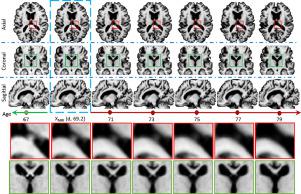Medical Image Analysis ( IF 10.7 ) Pub Date : 2021-10-14 , DOI: 10.1016/j.media.2021.102257 Daniele Ravi 1 , Stefano B Blumberg 1 , Silvia Ingala 2 , Frederik Barkhof 3 , Daniel C Alexander 1 , Neil P Oxtoby 1 ,

|
Accurate and realistic simulation of high-dimensional medical images has become an important research area relevant to many AI-enabled healthcare applications. However, current state-of-the-art approaches lack the ability to produce satisfactory high-resolution and accurate subject-specific images. In this work, we present a deep learning framework, namely 4D-Degenerative Adversarial NeuroImage Net (4D-DANI-Net), to generate high-resolution, longitudinal MRI scans that mimic subject-specific neurodegeneration in ageing and dementia. 4D-DANI-Net is a modular framework based on adversarial training and a set of novel spatiotemporal, biologically-informed constraints. To ensure efficient training and overcome memory limitations affecting such high-dimensional problems, we rely on three key technological advances: i) a new 3D training consistency mechanism called Profile Weight Functions (PWFs), ii) a 3D super-resolution module and iii) a transfer learning strategy to fine-tune the system for a given individual. To evaluate our approach, we trained the framework on 9852 T1-weighted MRI scans from 876 participants in the Alzheimer’s Disease Neuroimaging Initiative dataset and held out a separate test set of 1283 MRI scans from 170 participants for quantitative and qualitative assessment of the personalised time series of synthetic images. We performed three evaluations: i) image quality assessment; ii) quantifying the accuracy of regional brain volumes over and above benchmark models; and iii) quantifying visual perception of the synthetic images by medical experts. Overall, both quantitative and qualitative results show that 4D-DANI-Net produces realistic, low-artefact, personalised time series of synthetic T1 MRI that outperforms benchmark models.
中文翻译:

用于脑扫描模拟的退行性对抗性神经图像网络:在衰老和痴呆症中的应用
高维医学图像的准确而真实的模拟已成为与许多人工智能医疗保健应用相关的重要研究领域。然而,当前最先进的方法缺乏产生令人满意的高分辨率和准确的特定主题图像的能力。在这项工作中,我们提出了一个深度学习框架,即 4D-Dogenic Adversarial NeuroImage Net (4D-DANI-Net),用于生成高分辨率的纵向 MRI 扫描,模拟衰老和痴呆症中受试者特定的神经退行性变。 4D-DANI-Net 是一个基于对抗性训练和一组新颖的时空、生物学约束的模块化框架。为了确保有效的训练并克服影响此类高维问题的内存限制,我们依赖于三项关键技术进步:i)称为轮廓权重函数(PWF)的新 3D 训练一致性机制,ii)3D 超分辨率模块和 iii)一种针对特定个体微调系统的迁移学习策略。为了评估我们的方法,我们使用阿尔茨海默病神经影像计划数据集中 876 名参与者的 9852 幅 T1 加权 MRI 扫描来训练该框架,并提供了来自 170 名参与者的 1283 幅 MRI 扫描的单独测试集,以对个性化时间序列进行定量和定性评估的合成图像。我们进行了三项评估:i)图像质量评估; ii) 量化区域脑容量超过基准模型的准确性; iii) 量化医学专家对合成图像的视觉感知。总体而言,定量和定性结果均表明 4D-DANI-Net 生成真实、低伪影、个性化的合成 T1 MRI 时间序列,其性能优于基准模型。











































 京公网安备 11010802027423号
京公网安备 11010802027423号